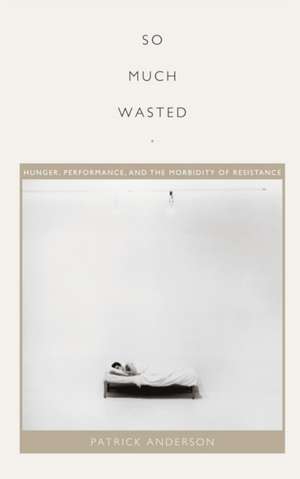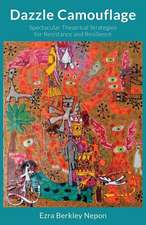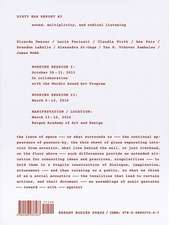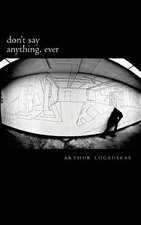So Much Wasted – Hunger, Performance, and the Morbidity of Resistance: Perverse Modernities: A Series Edited by Jack Halberstam and Lisa Lowe
Autor Patrick Andersonen Limba Engleză Paperback – 24 oct 2010
Din seria Perverse Modernities: A Series Edited by Jack Halberstam and Lisa Lowe
-
 Preț: 218.22 lei
Preț: 218.22 lei -
 Preț: 165.98 lei
Preț: 165.98 lei -
 Preț: 159.22 lei
Preț: 159.22 lei -
 Preț: 166.55 lei
Preț: 166.55 lei -
 Preț: 193.83 lei
Preț: 193.83 lei -
 Preț: 207.11 lei
Preț: 207.11 lei -
 Preț: 166.80 lei
Preț: 166.80 lei -
 Preț: 166.04 lei
Preț: 166.04 lei -
 Preț: 150.17 lei
Preț: 150.17 lei -
 Preț: 145.76 lei
Preț: 145.76 lei -
 Preț: 210.25 lei
Preț: 210.25 lei -
 Preț: 193.22 lei
Preț: 193.22 lei -
 Preț: 215.61 lei
Preț: 215.61 lei -
 Preț: 215.92 lei
Preț: 215.92 lei -
 Preț: 196.17 lei
Preț: 196.17 lei -
 Preț: 301.81 lei
Preț: 301.81 lei -
 Preț: 229.47 lei
Preț: 229.47 lei -
 Preț: 214.21 lei
Preț: 214.21 lei -
 Preț: 262.14 lei
Preț: 262.14 lei -
 Preț: 221.22 lei
Preț: 221.22 lei -
 Preț: 194.42 lei
Preț: 194.42 lei - 19%
 Preț: 603.61 lei
Preț: 603.61 lei -
 Preț: 266.18 lei
Preț: 266.18 lei -
 Preț: 260.41 lei
Preț: 260.41 lei -
 Preț: 261.38 lei
Preț: 261.38 lei -
 Preț: 211.88 lei
Preț: 211.88 lei -
 Preț: 304.10 lei
Preț: 304.10 lei -
 Preț: 231.12 lei
Preț: 231.12 lei -
 Preț: 204.71 lei
Preț: 204.71 lei
Preț: 228.50 lei
Nou
Puncte Express: 343
Preț estimativ în valută:
43.72€ • 45.77$ • 36.39£
43.72€ • 45.77$ • 36.39£
Carte tipărită la comandă
Livrare economică 31 martie-14 aprilie
Preluare comenzi: 021 569.72.76
Specificații
ISBN-13: 9780822348283
ISBN-10: 0822348284
Pagini: 208
Dimensiuni: 146 x 232 x 14 mm
Greutate: 0.27 kg
Editura: MD – Duke University Press
Seria Perverse Modernities: A Series Edited by Jack Halberstam and Lisa Lowe
ISBN-10: 0822348284
Pagini: 208
Dimensiuni: 146 x 232 x 14 mm
Greutate: 0.27 kg
Editura: MD – Duke University Press
Seria Perverse Modernities: A Series Edited by Jack Halberstam and Lisa Lowe
Cuprins
AcknowledgmentsIntroduction: Hunger in the Event of Subjectivity; 1. The Archive of Anorexia; 2. Enduring Performance; 3. How to Stage Self-Consumption; 4. To Lie Down to Death for Days; Afterword: The Ends of HungerNotes; References; Index
Recenzii
In this brilliant and important book, Patrick Anderson dramatically expands our understanding of anorexia by foregrounding its theatricality and reflexivity, and linking it to prison hunger strikes and certain kinds of endurance art. He shows us how central the self is to all of these practices, both as object, and as agent. Self-starvation is often the theatre of last resort, the stage on which a person performs when all others have been removed. It can also be a way of spitting out the poisonous images that one has been forced to incorporate. And even a well-balanced meal is not psychically nourishing when you are compelled to eat it, Anderson argues in the last and most compelling chapter of this book. Force-feeding does not support life; it promotes, rather, a living death.Kaja Silverman, University of California, BerkeleyPatrick Anderson has written a wonderful book, one that will have a real impact on the field of performance studies. The topic that he has chosen is important and timely: The forced feeding of prisoners on a hunger strike at Guantánamo, the anorexia epidemic among young women (and now men), and the removal of Terri Schiavos feeding tube are only some of the most recent and urgent questions that have surfaced around the practice and politics of starvation and who, ultimately, has the power over the individual body.Diana Taylor, author of The Archive and the Repertoire: Performing Cultural Memory in the Americas
"In this brilliant and important book, Patrick Anderson dramatically expands our understanding of anorexia by foregrounding its theatricality and reflexivity, and linking it to prison hunger strikes and certain kinds of endurance art. He shows us how central the self is to all of these practices, both as object, and as agent. Self-starvation is often the theatre of last resort, the stage on which a person performs when all others have been removed. It can also be a way of spitting out the poisonous images that one has been forced to incorporate. And even a well-balanced meal is not psychically nourishing when you are compelled to eat it, Anderson argues in the last and most compelling chapter of this book. Force-feeding does not support life; it promotes, rather, a living death."--Kaja Silverman, University of California, Berkeley "Patrick Anderson has written a wonderful book, one that will have a real impact on the field of performance studies. The topic that he has chosen is important and timely: The forced feeding of prisoners on a hunger strike at Guantanamo, the anorexia epidemic among young women (and now men), and the removal of Terri Schiavo's feeding tube are only some of the most recent and urgent questions that have surfaced around the practice and politics of starvation and who, ultimately, has the power over the individual body."--Diana Taylor, author of The Archive and the Repertoire: Performing Cultural Memory in the Americas
"In this brilliant and important book, Patrick Anderson dramatically expands our understanding of anorexia by foregrounding its theatricality and reflexivity, and linking it to prison hunger strikes and certain kinds of endurance art. He shows us how central the self is to all of these practices, both as object, and as agent. Self-starvation is often the theatre of last resort, the stage on which a person performs when all others have been removed. It can also be a way of spitting out the poisonous images that one has been forced to incorporate. And even a well-balanced meal is not psychically nourishing when you are compelled to eat it, Anderson argues in the last and most compelling chapter of this book. Force-feeding does not support life; it promotes, rather, a living death."--Kaja Silverman, University of California, Berkeley "Patrick Anderson has written a wonderful book, one that will have a real impact on the field of performance studies. The topic that he has chosen is important and timely: The forced feeding of prisoners on a hunger strike at Guantanamo, the anorexia epidemic among young women (and now men), and the removal of Terri Schiavo's feeding tube are only some of the most recent and urgent questions that have surfaced around the practice and politics of starvation and who, ultimately, has the power over the individual body."--Diana Taylor, author of The Archive and the Repertoire: Performing Cultural Memory in the Americas
Notă biografică
Textul de pe ultima copertă
"Patrick Anderson has written a wonderful book, one that will have a real impact on the field of performance studies. The topic that he has chosen is important and timely: the forced feeding of prisoners on a hunger strike at Guantanamo, the anorexia epidemic among young women (and now men), and the removal of Terri Schiavo's feeding tube are only some of the most recent and urgent questions that have surfaced around the practice and politics of starvation and who, ultimately, has the power over the individual body."--Diana Taylor, author of "The Archive and the Repertoire: Performing Cultural Memory in the Americas"
Descriere
An analysis of self-starvation as a significant mode of staging political arguments across the institutional domains of the clinic, the gallery and the prison























